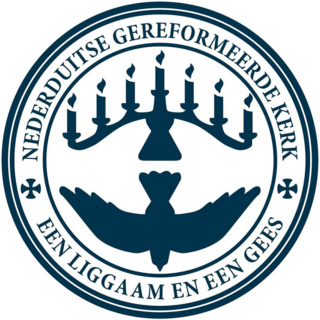Within Christianity, there are a variety of views on sexual orientation and homosexuality. The view that various Bible passages speak of homosexuality as immoral or sinful emerged in the first millennium AD, and has since become entrenched in many Christian denominations through church doctrine and the wording of various translations of the Bible.

The United Methodist Church (UMC) is a worldwide mainline Protestant denomination based in the United States, and a major part of Methodism. In the 19th century, its main predecessor, the Methodist Episcopal Church, was a leader in evangelicalism. The present denomination was founded in 1968 in Dallas, Texas, by union of the Methodist Church and the Evangelical United Brethren Church. The UMC traces its roots back to the revival movement of John and Charles Wesley in England, as well as the Great Awakening in the United States. As such, the church's theological orientation is decidedly Wesleyan. It embraces liturgical worship, holiness, and evangelical elements.

The Russian Orthodox Church, alternatively legally known as the Moscow Patriarchate, is an autocephalous Eastern Orthodox Christian church. It has 194 dioceses inside Russia. The primate of the ROC is the Patriarch of Moscow and all Rus'.
Freedom of religions in Georgia is provided for by the country's constitution, laws, and policies. In practice, the Georgian government generally respects religious freedom; however, the Georgian Orthodox Church enjoys a privileged status in terms of legal and tax matters, involvement in public schools, and property disputes. There have been efforts by private citizens, local government officials, and local Georgian Orthodox Church leaders to harass and persecute members of minority religious groups and interfere with their worship activities; despite calls for tolerance and respect for pluralism by government leaders, the Georgian central government has not been successful in preventing such incidents.

The Apostolic Autocephalous Orthodox Church of Georgia, commonly known as the Georgian Orthodox Church or the Orthodox Church of Georgia, is an autocephalous Eastern Orthodox church in full communion with the other churches of Eastern Orthodoxy. It is Georgia's dominant religious institution, and a majority of Georgian people are members. The Orthodox Church of Georgia is one of the oldest churches in the world. It asserts apostolic foundation, and that its historical roots can be traced to the early and late Christianization of Iberia and Colchis by Andrew the Apostle in the 1st century AD and by Saint Nino in the 4th century AD, respectively. As in similar autocephalous Eastern Orthodox Christian churches, the church's highest governing body is the holy synod of bishops. The church is headed by the Patriarch of All Georgia, Ilia II, who was elected in 1977.

Ilia II, also transcribed as Ilya or Elijah, is the Catholicos-Patriarch of All Georgia, the spiritual leader of the Georgian Orthodox Church. He is officially styled as "Catholicos-Patriarch of All Georgia, the Archbishop of Mtskheta-Tbilisi and Metropolitan Bishop of Bichvinta and Tskhum-Abkhazia, His Holiness and Beatitude Ilia II."
The Orthodox Presbyterian Church (OPC) is a confessional Presbyterian denomination located primarily in the United States, with additional congregations in Canada, Bermuda, and Puerto Rico. It was founded by conservative members of the Presbyterian Church in the United States of America (PCUSA), who objected to the rise of Liberal and Modernist theology in the 1930s. The OPC is considered to have had an influence on evangelicalism far beyond its size.
The Eastern Orthodox Church presents a view of sin distinct from views found in Catholicism and in Protestantism, that sin is viewed primarily as a terminal spiritual sickness, rather than a state of guilt, a self-perpetuating illness which distorts the whole human being and energies, corrupts the Image of God inherent in those who bear the human nature, diminishes the divine likeness within them, disorients their understanding of the world as it truly is, and distracts a person from fulfilling his natural potential to become deified in communion with God.

LGBT rights opposition is the opposition to legal rights, proposed or enacted, for lesbian, gay, bisexual, and transgender (LGBT) people. Laws that LGBT rights opponents may be opposed to include civil unions or partnerships, LGBT parenting and adoption, military service, access to assisted reproductive technology, and access to sex reassignment surgery and hormone replacement therapy for transgender individuals.

Abune Paulos was the fifth Patriarch of the Ethiopian Orthodox Tewahedo Church from 1992 to his death in 2012. His full title was "His Holiness Abuna Paulos, Fifth Patriarch of the Orthodox Tewahido Church of Ethiopia, Ichege of the see of Saint Tekle Haymanot, Archbishop of Axum and one of the seven serving Presidents of the World Council of Churches."

The Dutch Reformed Church is a Reformed Christian denomination in South Africa. It also has a presence in neighbouring countries, such as Namibia, Eswatini, and parts of Botswana, Zimbabwe and Zambia. In 2013 it claimed 1.1 million members and 1,602 ordained ministers in 1,158 congregations.

Lesbian, gay, bisexual and transgender (LGBT) people in Georgia face significant challenges not experienced by non-LGBT residents. Georgia is one of only a few countries in the former Soviet space that directly prohibits discrimination against all LGBT people in legislation, labor-related or otherwise. Since 2012, Georgian law has considered crimes committed on the grounds of one's sexual orientation or gender identity an aggravating factor in prosecution. The legislative ban on discrimination has been enacted as a part of the Government efforts to bring the country closer to the European Union and make the country's human rights record in line with the demands of Georgia's European and Euro-Atlantic integration.
Attitudes in Presbyterianism toward homosexuality vary, ranging from outright condemnation to complete acceptance.
The Catholic Church condemns same-sex sexual activity and denies the validity of same-sex marriage. While the Church opposes "unjust" discrimination against homosexual persons, it supports what it considers "just" discrimination in the employment of teachers or athletic coaches, in adoption, in the military and in housing. The Catechism of the Catholic Church promulgated by Pope John Paul II considers sexual activity between members of the same sex to be a grave sin against chastity and sees homosexual attraction as objectively disordered. However, the Catechism also states that homosexuals "must be accepted with respect, compassion, and sensitivity". This teaching has developed through papal interventions, and influenced by theologians, including the Church Fathers.
The Constitutional Agreement between the Georgian state and the Apostolic Autocephalous Orthodox Church of Georgia, informally referred to as the Concordat, is an agreement between the Georgian Orthodox Church (GOC) and the state that defines relations between the two entities. It was signed by President of Georgia Eduard Shevardnadze and Patriarch of Georgia Ilia II on 14 October 2002 at Svetitskhoveli Cathedral in Mtskheta, Georgia.

Christianity is the predominant religion in Georgia. The wide variety of peoples inhabiting Georgia has meant a correspondingly rich array of active religions in the country.
Many views are held or have been expressed by religious organisation in relation to same-sex marriage. Arguments both in favor of and in opposition to same-sex marriage are often made on religious grounds and/or formulated in terms of religious doctrine. Although many of the world's religions are opposed to same-sex marriage, the number of religious denominations that are conducting same-sex marriages have been increasing since 2010. Religious views on same-sex marriage are closely related to religious views on homosexuality.

A Christian state is a country that recognizes a form of Christianity as its official religion and often has a state church, which is a Christian denomination that supports the government and is supported by the government.
Abortion in Georgia is legal on request within the first 12 weeks of pregnancy. Between 12 and 22 weeks, abortions may be performed on medical grounds under conditions established by the Ministry of Health, Labour and Social Affairs. After 22 weeks, abortions additionally require approval of a three-member medical committee. The law governing abortion was instituted in 2000.











